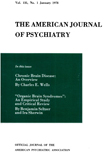AUTHORITARIAN PARENTS AND DISTURBED CHILDREN
Abstract
Students of authoritarianism often hold axiomatically that interaction within the nuclear family is the source and context for children's personal development. They assume, 1. That "fascist-conservative" parents yield children with psychopathology, and 2. That parents who are "unable to take on the role of the child in imagination" also yield children with psychopathology. Both those parents who are "fascist-conservative" and the parents who are deficient in "child-role-taking" are regarded as authoritarian parents. Thus, the researchers give to "authoritarianism" two distinct referents. This report was based upon a study designed to test quantitatively the relevance of parental authoritarianism to children's psychopathology.
Choosing a random group of 17 emotionally disturbed children whose parents cooperated, we studied their parents' authoritarianism by means of standard tests and questionnaires, demographic analysis, and focused interviews. Hypotheses concerning the relation of parental authoritarianism and the reference child's illness were tested in both the experimental group and in a matched control group of parents of seventeen normal children. Careful matching was effected for age, ordinal position and sex of child; and for education, residence, economic level and ethnic background of parents.
High-authoritarian and low-authoritarian parents in both experimental and control groups were examined with respect to their demographic characteristics and their role-playing as parents, spouses, and as self-perceiving individuals. The parents' ability to take the child's role was regarded as an aspect of parental role-playing.
For the 68 parents dealt with, when authoritarianism is seen as inability to take on the child's role, the parents of disturbed children differ significantly (P < .01) from the parents of normal children. On the other hand, when authoritarianism is seen as fascism-conservatism, contrary to expectations, the parents of disturbed children are not significantly differentiated from the parents of normal controls. Hence, our predictions about the effect of parents' political beliefs were invalidated, but our predictions about the effect of parents' role-taking were substantiated.
From theory laid on evidence, it can be assumed that the value systems of parents operate as a cultural parameter of their children's mental health and illness, but the task ahead is to understand what values relate closest to children's emotional illness.
Access content
To read the fulltext, please use one of the options below to sign in or purchase access.- Personal login
- Institutional Login
- Sign in via OpenAthens
- Register for access
-
Please login/register if you wish to pair your device and check access availability.
Not a subscriber?
PsychiatryOnline subscription options offer access to the DSM-5 library, books, journals, CME, and patient resources. This all-in-one virtual library provides psychiatrists and mental health professionals with key resources for diagnosis, treatment, research, and professional development.
Need more help? PsychiatryOnline Customer Service may be reached by emailing [email protected] or by calling 800-368-5777 (in the U.S.) or 703-907-7322 (outside the U.S.).



